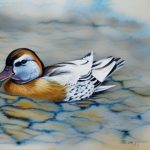Duck breeding farms play a crucial role in meeting the demand for duck products such as meat and eggs. Ducks are a popular choice for many consumers due to their rich, flavorful meat and nutritious eggs. As a result, there is a growing need for duck breeding farms to ensure a sustainable and consistent supply of duck products. Additionally, duck farming provides an opportunity for farmers to diversify their agricultural activities and generate additional income. Duck breeding farms also contribute to the local economy by creating employment opportunities and supporting related industries such as feed suppliers, equipment manufacturers, and transportation services. Furthermore, duck breeding farms can play a role in preserving and promoting rare or endangered duck breeds, contributing to the conservation of genetic diversity in the poultry industry.
Duck breeding farms are also important for meeting the dietary needs of consumers who are looking for alternative sources of protein and nutrition. Duck meat is known for its high protein content and rich flavor, making it a popular choice for many culinary dishes. Duck eggs are also sought after for their larger size and higher nutrient content compared to chicken eggs. By providing a sustainable source of duck products, breeding farms contribute to food security and help meet the nutritional needs of communities. Additionally, duck farming can be an environmentally friendly option, as ducks are efficient foragers and can help control pests in agricultural fields. Overall, duck breeding farms play a vital role in meeting the demand for high-quality duck products, supporting local economies, and promoting sustainable agricultural practices.
Key Takeaways
- Duck breeding farms play a crucial role in providing a sustainable source of duck meat and eggs for consumption.
- Selecting the right breeds for your duck farm is essential for ensuring the success and productivity of your farm.
- Setting up a duck breeding farm requires careful planning and consideration of factors such as housing, feeding, and breeding facilities.
- Managing the health and nutrition of your ducks is vital for their overall well-being and productivity on the farm.
- Breeding and hatching ducklings require proper incubation and care to ensure the successful growth and development of the ducklings.
Selecting the Right Breeds for Your Duck Farm
When starting a duck breeding farm, it is essential to carefully select the right breeds that align with your farming goals and local market demand. There are various duck breeds to choose from, each with its own unique characteristics and suitability for different farming systems. For meat production, popular breeds such as Pekin ducks are known for their rapid growth and efficient feed conversion, making them a top choice for commercial meat production. Muscovy ducks are another popular choice for meat production due to their lean and flavorful meat. For egg production, breeds such as Khaki Campbell and Indian Runner ducks are known for their high egg-laying capacity, making them ideal for farmers looking to focus on egg production.
In addition to considering production traits, it is important to select breeds that are well-suited to your local climate and environmental conditions. Some duck breeds are more cold-hardy, while others are better adapted to warmer climates. It is also important to consider the availability of breed stock in your area and the potential market demand for specific duck products. By carefully selecting the right breeds for your duck farm, you can maximize production efficiency, meet market demand, and ensure the overall success of your breeding operation.
Setting Up Your Duck Breeding Farm
Setting up a duck breeding farm requires careful planning and consideration of various factors such as housing, equipment, and biosecurity measures. The first step is to establish suitable housing facilities that provide adequate space, ventilation, and protection from predators and extreme weather conditions. Ducks require access to water for drinking and bathing, so it is important to provide water sources such as ponds or water troughs within the housing area. Additionally, nesting areas should be provided for breeding ducks to lay their eggs in a safe and comfortable environment.
Equipment such as feeders, drinkers, and nesting boxes should be installed to ensure the well-being of the ducks and facilitate efficient management practices. Biosecurity measures are also crucial to prevent the spread of diseases and maintain the health of the flock. This includes implementing strict hygiene protocols, controlling visitor access, and monitoring the health status of the ducks regularly. Furthermore, it is important to comply with local regulations and obtain any necessary permits or licenses for operating a duck breeding farm. By carefully setting up your duck breeding farm with proper housing, equipment, and biosecurity measures, you can create a conducive environment for the health and productivity of your ducks.
Managing the Health and Nutrition of Your Ducks
Managing the health and nutrition of ducks is essential for ensuring optimal growth, reproduction, and overall well-being of the flock. Providing a balanced diet that meets the nutritional requirements of ducks is crucial for supporting their growth, egg production, and immune function. Ducks require a diet that is rich in protein, vitamins, and minerals to support their physiological needs. Commercially formulated duck feeds are available in various formulations tailored to different stages of growth and production. It is important to provide access to clean water at all times, as ducks have high water requirements for digestion and thermoregulation.
In addition to nutrition, proactive health management practices are essential for preventing diseases and maintaining the overall health of the flock. This includes regular health checks, vaccination programs, parasite control, and prompt treatment of any illnesses or injuries. It is important to work closely with a veterinarian with experience in poultry health to develop a comprehensive health management plan for your duck breeding farm. Additionally, implementing good hygiene practices within the housing facilities and regularly cleaning and disinfecting equipment can help prevent the spread of diseases. By prioritizing the health and nutrition of your ducks, you can ensure the long-term success and sustainability of your breeding operation.
Breeding and Hatching Ducklings
Breeding and hatching ducklings is a critical aspect of duck farming that requires careful management and attention to detail. To facilitate successful breeding, it is important to provide suitable nesting areas with comfortable bedding materials where female ducks can lay their eggs. It is also essential to ensure that male-to-female ratios are appropriate to prevent aggressive mating behavior and ensure successful fertilization of eggs. Once eggs are laid, they should be collected daily to prevent damage or contamination.
To hatch ducklings, eggs can be placed in an incubator with controlled temperature and humidity settings to mimic natural nesting conditions. Alternatively, some farmers may choose to allow broody female ducks to incubate their eggs naturally. Proper turning of the eggs during incubation is important to prevent embryonic malformations and ensure uniform development. Close monitoring of temperature and humidity levels is crucial throughout the incubation period to maximize hatch rates.
After hatching, newly hatched ducklings should be provided with a warm and dry environment to support their early development. Access to clean water and starter feed should be provided immediately after hatching to support their nutritional needs. Careful management practices during the breeding and hatching process are essential for ensuring the successful reproduction and early development of ducklings on your farm.
Marketing and Selling Your Duck Products

Marketing and selling duck products require strategic planning and consideration of various factors such as target markets, product differentiation, and distribution channels. Understanding the preferences and needs of your target customers is essential for developing effective marketing strategies. Whether you are selling duck meat or eggs, highlighting the unique qualities of your products such as flavor, nutritional value, or production methods can help differentiate your offerings in the market.
Utilizing various marketing channels such as farmers’ markets, online platforms, or direct sales to restaurants and retailers can help reach a wider customer base. Building relationships with local chefs, retailers, and consumers can also help create awareness and demand for your duck products. Additionally, offering value-added products such as duck charcuterie or specialty egg products can further diversify your product offerings and appeal to different customer segments.
Packaging and labeling also play a crucial role in marketing your duck products. Eye-catching packaging designs and clear product information can help attract customers’ attention and communicate the quality of your products. Furthermore, obtaining any necessary certifications or endorsements such as organic or free-range labels can help build trust with consumers who prioritize ethical and sustainable food choices.
Challenges and Considerations for Duck Breeding Farms
Duck breeding farms face various challenges that require careful consideration and proactive management strategies. Disease outbreaks such as avian influenza or other infectious diseases can pose significant risks to the health of the flock and may require strict biosecurity measures or vaccination programs to mitigate these risks. Predation by wild animals or pests can also threaten the safety of ducks and may require protective measures such as fencing or predator deterrents.
Environmental factors such as extreme weather events or changes in climate patterns can impact the well-being of ducks and may require adjustments in housing or management practices to ensure their comfort and safety. Additionally, market fluctuations or changes in consumer preferences can impact the demand for duck products, requiring flexibility in marketing strategies or product diversification.
Labor management is another consideration for duck breeding farms, as managing daily care routines, breeding activities, health monitoring, and marketing efforts requires dedicated time and resources. Developing efficient management systems and training protocols for farm workers can help streamline operations and ensure consistent care for the flock.
Overall, being aware of these challenges and implementing proactive management strategies can help duck breeding farms navigate potential risks and ensure the long-term success of their operations. By prioritizing animal health, efficient production practices, strategic marketing efforts, and adaptability to changing conditions, duck breeding farms can thrive in meeting the demand for high-quality duck products while contributing to sustainable agricultural practices.
If you’re interested in learning more about poultry farming, you might want to check out this article on whether geese can eat chicken feed. It provides valuable insights into the dietary needs of geese and how it relates to poultry farming practices. Understanding the nutritional requirements of different poultry species is essential for successful breeding and farming operations.
FAQs
What is a duck breeding farm?
A duck breeding farm is a facility where ducks are raised and bred for various purposes, such as meat production, egg production, or for breeding purposes to sell ducklings to other farms.
What are the common breeds of ducks raised on a breeding farm?
Common breeds of ducks raised on breeding farms include Pekin, Mallard, Muscovy, and Khaki Campbell. These breeds are often chosen for their meat or egg production capabilities.
What are the main purposes of a duck breeding farm?
The main purposes of a duck breeding farm are to produce duck meat, duck eggs, and to breed ducks for sale to other farms or individuals.
What are the key considerations for running a successful duck breeding farm?
Key considerations for running a successful duck breeding farm include providing proper housing, nutrition, and healthcare for the ducks, as well as managing breeding programs and marketing the products.
What are the challenges faced by duck breeding farms?
Challenges faced by duck breeding farms may include disease management, predator control, and market fluctuations. Additionally, ensuring proper welfare and ethical treatment of the ducks is an ongoing challenge for many farms.
Meet Walter, the feathered-friend fanatic of Florida! Nestled in the sunshine state, Walter struts through life with his feathered companions, clucking his way to happiness. With a coop that’s fancier than a five-star hotel, he’s the Don Juan of the chicken world. When he’s not teaching his hens to do the cha-cha, you’ll find him in a heated debate with his prized rooster, Sir Clucks-a-Lot. Walter’s poultry passion is no yolk; he’s the sunny-side-up guy you never knew you needed in your flock of friends!







